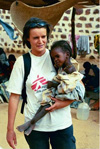
According to the basic principle of state sovereignty, international agencies have to be invited by the host government to operate in a country, and as recent events have made tragically clear, that privilege can also be take away. (It is a different question entirely as to the rights of the international community to intervene in cases where governments are systematically denying their people life saving assistance.)
President Bashir’s "justification" for expelling aid organizations was his claim that they contributed evidence to bolster the ICC’s case against him and had overstepped their boundaries. In reality, Bashir saw the warrant as an excuse to re-deploy one of his favorite weapons against his own people: starvation. He’s done it before.
An Op-Ed by Christophe Fournier, president of the International Council of Doctors Without Borders, in yesterday’s International Herald Tribune explores the issue of international aid agency neutrality.
A post on AlertNet yesterday highlights the other regions of Sudan that are being hit hard by the agency expulsion. Sara Pantuliano identifies the areas of acute concern as Abyei, Southern Kordofan, and Blue Nile, as well as the eastern region. She notes:
Unlike in Darfur, there is very little additional capacity beyond the expelled agencies to even attempt to fill these gaps. The Three Areas have suffered from a lack of investment from donors and international agencies.

